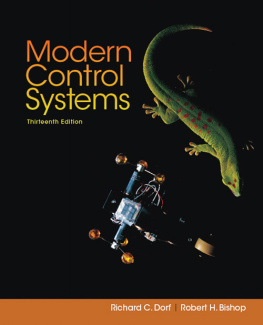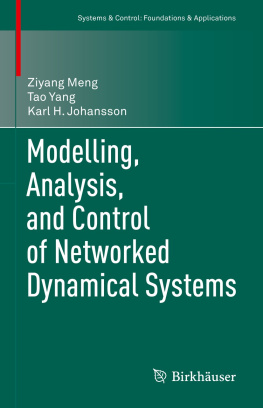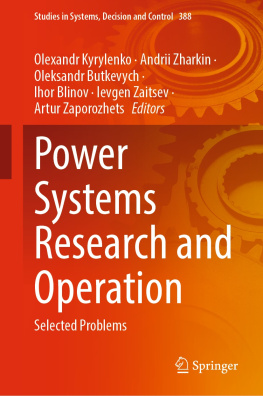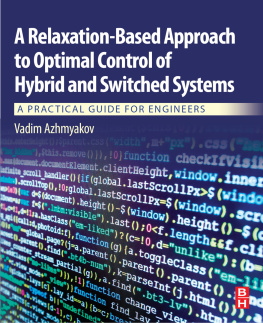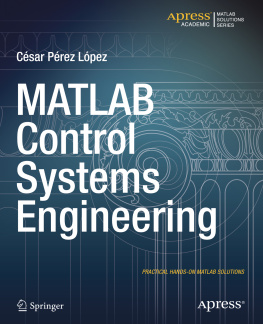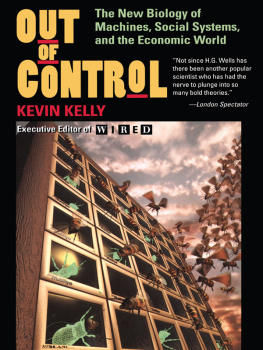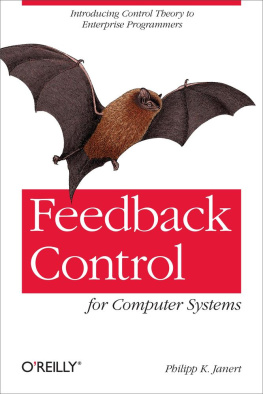Richard C. Dorf - Modern Control Systems, 13/e
Here you can read online Richard C. Dorf - Modern Control Systems, 13/e full text of the book (entire story) in english for free. Download pdf and epub, get meaning, cover and reviews about this ebook. year: 2016, publisher: Pearson, genre: Computer. Description of the work, (preface) as well as reviews are available. Best literature library LitArk.com created for fans of good reading and offers a wide selection of genres:
Romance novel
Science fiction
Adventure
Detective
Science
History
Home and family
Prose
Art
Politics
Computer
Non-fiction
Religion
Business
Children
Humor
Choose a favorite category and find really read worthwhile books. Enjoy immersion in the world of imagination, feel the emotions of the characters or learn something new for yourself, make an fascinating discovery.
- Book:Modern Control Systems, 13/e
- Author:
- Publisher:Pearson
- Genre:
- Year:2016
- Rating:4 / 5
- Favourites:Add to favourites
- Your mark:
- 80
- 1
- 2
- 3
- 4
- 5
Modern Control Systems, 13/e: summary, description and annotation
We offer to read an annotation, description, summary or preface (depends on what the author of the book "Modern Control Systems, 13/e" wrote himself). If you haven't found the necessary information about the book — write in the comments, we will try to find it.
Modern Control Systems, 13/e — read online for free the complete book (whole text) full work
Below is the text of the book, divided by pages. System saving the place of the last page read, allows you to conveniently read the book "Modern Control Systems, 13/e" online for free, without having to search again every time where you left off. Put a bookmark, and you can go to the page where you finished reading at any time.
Font size:
Interval:
Bookmark:

Thirteenth Edition
Thirteenth Edition
Richard C. Dorf
University of California, Davis
Robert H. Bishop
The University of South Florida

HobokenBostonColumbusSan FranciscoNew York IndianapolisLondonTorontoSydneySingaporeTokyoMontreal DubaiMadridHong KongMexico CityMunichParisAmsterdamCape Town
Vice President and Editorial Director, ECS: Marcia J. Horton
Acquisitions Editor: Julie Bai
Editorial Assistant: Michelle Bayman
Executive Marketing Manager: Tim Galligan
Director of Marketing: Christy Lesko
Product Marketing Manager: Bram van Kempen
Field Marketing Manager: Demetrius Hall
Marketing Assistant: Jon Bryant
Team Lead Program and Product Management: Scott Disanno
Program Manager: Joanne Manning
Global HE Director of Vendor Sourcing and Procurement: Diane Hynes
Director of Operations: Nick Sklitsis
Operations Specialist: Maura Zaldivar-Garcia
Creative Director: Blair Brown
Art Director: Janet Slowik
Cover Design: QT Design
Cover Image: 2000 Peter Menzel, www.menzelphoto.com, robo Sapiens
Manager, Rights and Permissions: Rachel Youdelman
Printer/Binder: Edwards Brothers Malloy Jackson Rd
Cover Printer: Phoenix Color/Hagerstown
Composition/Full-Service Project Management: Integra Software Services Pvt. Ltd.
LabVIEW is a trademark of National Instruments. MATLAB is a registered trademark of The MathWorks, Inc. Company and product names mentioned herein are the trademarks or registered trademarks of their respective owners.
Copyright 2017, 2011, 2008, 2005 by Pearson Education, Inc., Hoboken, New Jersey 07030. All rights reserved. Manufactured in the United States of America. This publication is protected by Copyright and permissions should be obtained from the publisher prior to any prohibited reproduction, storage in a retrieval system, or transmission in any form or by any means, electronic, mechanical, photocopying, recording, or likewise. For information regarding permission(s), write to: Rights and Permissions Department, 221 River Street, Hoboken, NJ 07030.
The author and publisher of this book have used their best efforts in preparing this book. These efforts include the development, research, and testing of the theories and programs to determine their effectiveness. The author and publisher make no warranty of any kind, expressed or implied, with regard to these programs or the documentation contained in this book. The author and publisher shall not be liable in any event for incidental or consequential damages in connection with, or arising out of, the furnishing, performance, or use of these programs.
Library of Congress Cataloging-in-Publication Data
Names: Dorf, Richard C., author.|Bishop, Robert H., 1957- author.
Title: Modern control systems / Richard C. Dorf, University of California, Davis, Robert H. Bishop, University of South Florida.
Description: 13e [13th edition].|Boston : Pearson, []
Identifiers: LCCN 2015036924|ISBN 9780134407623|ISBN 0134407628
Subjects: LCSH: Feedback control systems.
Classification: LCC TJ216 .D67 2016|DDC 629.8/3dc22
LC record available at http://lccn.loc.gov/2015036924
10987654321

ISBN-10:0-13-440762-8
ISBN-13: 978-0-13-440762-3
Of the greater teachers
when they are gone,
their students will say:
we did it ourselves.
Dedicated to
Lynda Ferrera Bishop
and
Joy MacDonald Dorf
In grateful appreciation
Global issues such as climate change, clean water, sustainability, waste management, emissions reduction, and minimizing raw material and energy use have led many engineers to re-think existing approaches to engineering design. One outcome of the evolving design strategy is to consider green engineering. The goal of green engineering is to design products that minimize pollution, reduce the risk to human health, and improve the environment. Applying the principles of green engineering highlights the power of feedback control systems as an enabling technology.
To reduce greenhouse gases and minimize pollution, it is necessary to improve both the quality and quantity of our environmental monitoring systems. One example is to use wireless measurements on mobile sensing platforms to measure the external environment. Another example is to monitor the quality of the delivered power to measure leading and lagging power, voltage variations, and waveform harmonics. Many green engineering systems and components require careful monitoring of current and voltages. For example, current transformers are used in various capacities for measuring and monitoring current within the power grid network of interconnected systems used to deliver electricity. Sensors are key components of any feedback control system because the measurements provide the required information as to the state of the system so the control system can take the appropriate action.
The role of control systems in green engineering will continue to expand as the global issues facing us require ever increasing levels of automation and precision. In the book, we present key examples from green engineering such as wind turbine control and modeling of a photovoltaic generator for feedback control to achieve maximum power delivery as the sunlight varies over time.
The wind and sun are important sources of renewable energy around the world. Wind energy conversion to electric power is achieved by wind energy turbines connected to electric generators. The intermittency characteristic of the wind makes smart grid development essential to bring the energy to the power grid when it is available and to provide energy from other sources when the wind dies down or is disrupted. A smart grid can be viewed as a system comprised of hardware and software that routes power more reliably and efficiently to homes, businesses, schools, and other users of power in the presence of intermittency and other disturbances. The irregular character of wind direction and power also results in the need for reliable, steady electric energy by using control systems on the wind turbines themselves. The goal of these control devices is to reduce the effects of wind intermittency and the effect of wind direction change. Energy storage systems are also critical technologies for green engineering. We seek energy storage systems that are renewable, such as fuel cells. Active control can be a key element of effective renewable energy storage systems as well.
Another exciting development for control systems is the evolution of the Internet of Thingsa network of physical objects embedded with electronics, software, sensors and connectivity. As envisioned, each of the millions of the devices on the network will possess an embedded computer with connectivity to the Internet. The ability to control these connected devices will be of great interest to control engineers. Indeed, control engineering is an exciting and a challenging field. By its very nature, control engineering is a multidisciplinary subject, and it has taken its place as a core course in the engineering curriculum. It is reasonable to expect different approaches to mastering and practicing the art of control engineering. Since the subject has a strong mathematical foundation, we might approach it from a strictly theoretical point of view, emphasizing theorems and proofs. On the other hand, since the ultimate objective is to implement controllers in real systems, we might take an ad hoc approach relying only on intuition and hands-on experience when designing feedback control systems. Our approach is to present a control engineering methodology that, while based on mathematical fundamentals, stresses physical system modeling and practical control system designs with realistic system specifications.
Next pageFont size:
Interval:
Bookmark:
Similar books «Modern Control Systems, 13/e»
Look at similar books to Modern Control Systems, 13/e. We have selected literature similar in name and meaning in the hope of providing readers with more options to find new, interesting, not yet read works.
Discussion, reviews of the book Modern Control Systems, 13/e and just readers' own opinions. Leave your comments, write what you think about the work, its meaning or the main characters. Specify what exactly you liked and what you didn't like, and why you think so.

